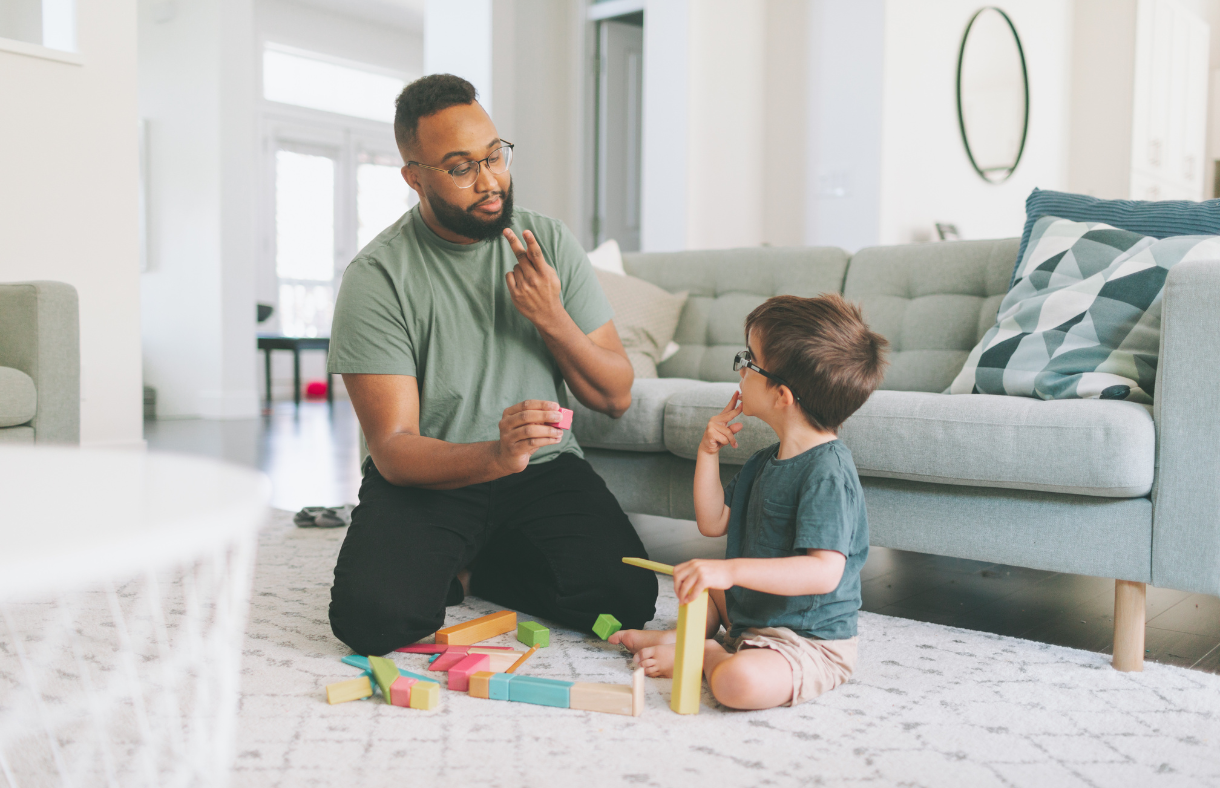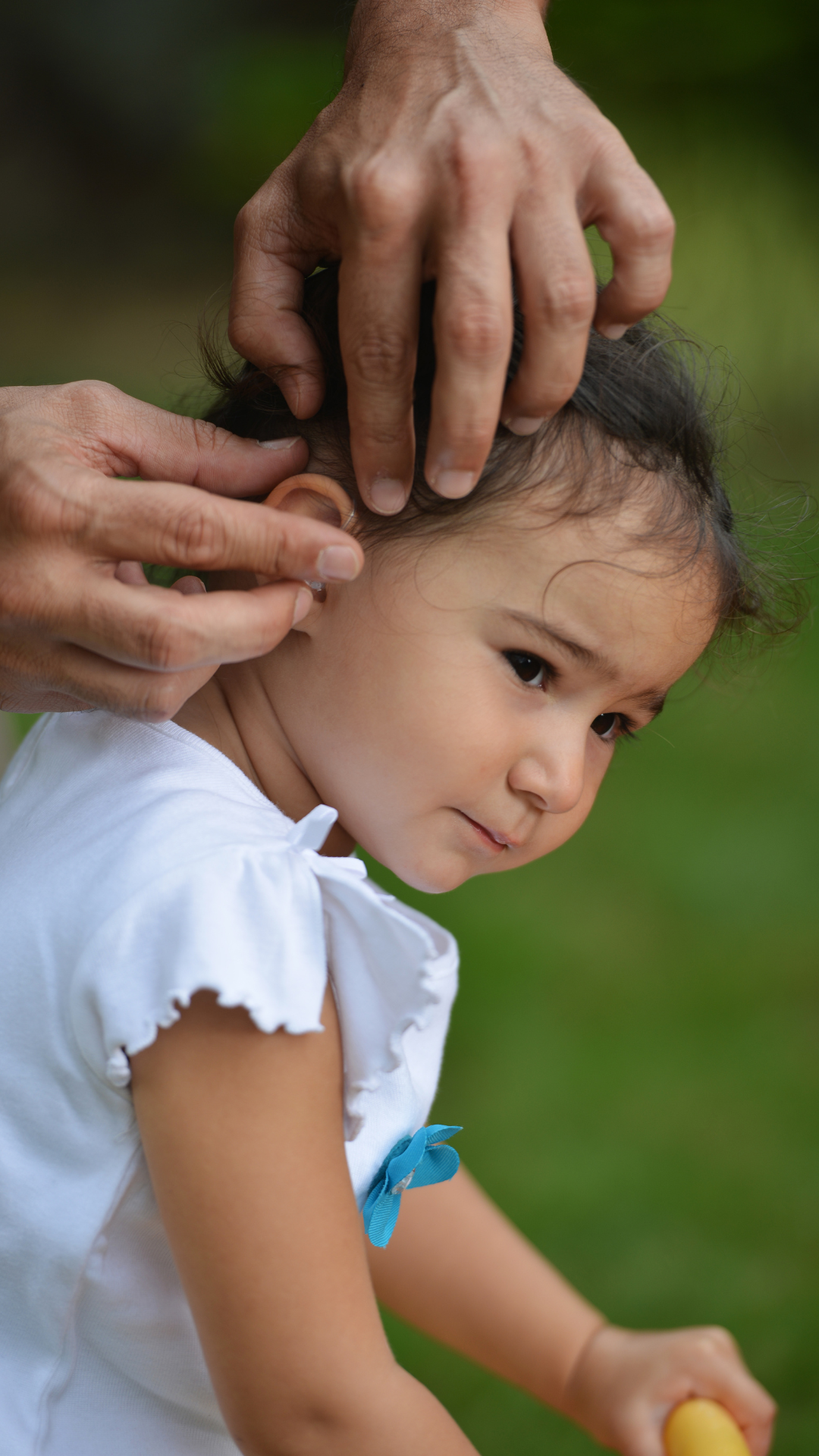“The problems of deafness are deeper and more complex … than those of blindness. Deafness … means the loss of the most vital stimulus—the sound of the voice that brings language, sets thoughts astir and keeps us in [human] intellectual company.”
–Helen Keller, disability-rights advocate who lost sight and hearing in toddlerhood
Deafness or severe hearing loss is handicap enough when it comes after the age of language acquisition. But being born deaf can condemn a person to a lifetime of loneliness. Imagine being dropped into an alien civilization where people not only speak a language you find indecipherable, but communicate telepathically or in tones too high-pitched for human hearing. That’s what our world is like for pre-literate children whose ears lack ordinary sound-detection abilities.

It Doesn’t Run in the Family
While hearing loss can be genetic, over 90 percent of people born deaf have parents with normal hearing. The parents may not even recognize their child’s communication problems as a purely physical disability, since symptoms can resemble those of autism or other neurological issues. The greater tragedy is that when treated as children with mental disabilities, many children do in fact develop mental disabilities—not because it was inevitable, but from despair at being constantly misjudged and misunderstood, and from frustration over being unable to express their feelings effectively.
The situation takes a toll on the rest of the family as well, especially when they sense that approaches designed for other disabilities aren’t getting through or that the whole diagnosis is wrong—but they can’t think of any alternative ideas.
Language Deprivation Syndrome
If deafness continues undiagnosed and youngsters reach their preteen years without ever having been exposed to complex language in a form they can understand, their brains may never develop full capacity to translate visual cues into more complex concepts. Likely consequences include impaired reasoning ability, proneness to mood swings, and fear of authority figures (whom deaf people frequently associate with threatening gestures and the use of unprovoked physical force).
Outside the barriers of total isolation, many deaf people seek refuge in the company of other deaf people, forming tight-knit communities that shut out the hearing world. While this is better than living in a solitary shell, it still generates mistrust and deprives members of opportunities to reach their full potential.

Take Action Early
Fortunately, congenital hearing loss is far less likely to go undetected today, as modern medicine routinely screens the hearing of newborns and can even diagnose hearing disabilities before birth. The best time to take action against worse problems is as soon as a problem is detected.
As soon as the diagnosis arrives, plan how you will communicate love and attention to your child; what will be their “first language” (a therapist or sign-language teacher can help you work this out); how they will learn literacy (a child who learned to talk via American Sign Language has special challenges translating it to written English, which uses different grammar rules); and how you will deal with possible problems.
Planning tips:
- Apply for assistance and special-education programs as soon as you learn of the diagnosis, even if it will be several years before your family needs these services. Waiting lists can be unbelievably long.
- Look into additional health insurance to cover possible future needs, including special therapy, ear surgery, and greater risk of injury.
- Connect with every resource and service you can locate, not just the most obvious ones. Check with local and state governments (in Texas, with the Office of Deaf and Hard of Hearing Services), religious congregations, community centers, and private schools.
- Get personally acquainted with other parents of deaf children, ideally through an organized support group.
- Build a support network of family, neighbors, and babysitters to help conserve your own energy and patience.
- Consider what special accommodations will be necessary in your home (e.g., visible lights connected to doorbells and smoke alarms).

The Universal Languages: Love and Respect
Your child may have partial hearing, or may be completely unable to perceive sound. Either way, don’t be embarrassed about following your natural instincts to talk to him or her. Your facial expression, body language, and some voice vibrations are still getting through.
Do be careful about what else your “unspoken words” communicate. Even without voice tone as an additional clue, children can tell when you’re impatient, angry, or condescending. Like anyone else, they want to be valued for the individuals they are, not judged by what others think they should be.
Additional tips for knowing and valuing your deaf children as individuals:
- Use regular physical touch as a means of communicating affection. Close contact will also enable children to better “hear” the vibrations of your voice tone and the general vibes of your feelings.
- Stay within their clear line of vision when communicating. If you need their attention, walk over to them, or use a nonverbal cue such as tapping the table or switching a light off and on. (Hearing parents do sometimes forget that it’s unreasonable to expect a deaf child to turn around when called from behind.)
- Do. Not. Shout. Not even if a child has partial hearing, unless they’ve specifically asked you to speak louder. Shouting communicates impatience and/or condescension—plus, it distorts your mouth movements and makes your speech harder to “read” visually.
- Encourage your children to express themselves through art and active play—and to discover their unique natural talents.
- Whenever possible, let them take the lead in determining the best way to communicate.
See also: BridgingApps recommendations for technology useful to deaf people

